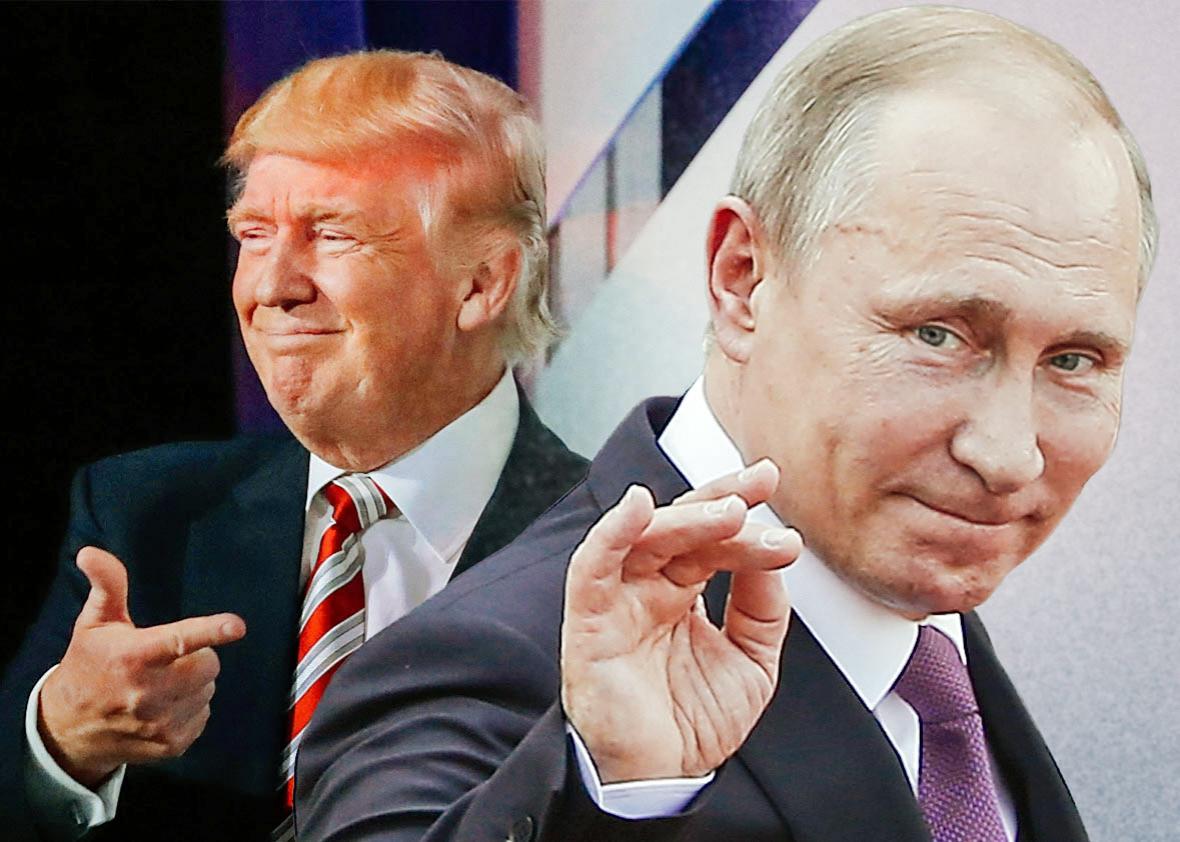Donald Trump admires authoritarians. It’s one of the clearest and most consistent lines in his rhetoric and thought. In a 1990 interview with Playboy, he praised the Chinese government for its handling of the student protesters at Tiananmen Square, a massacre that claimed at least hundreds of lives. “They put it down with strength,” said Trump. “That shows you the power of strength. Our country is right now perceived as weak.”
Even as he runs for president of the United States—a liberal democracy of individual rights and constitutional government—Trump can’t hide how impressed he is with dictators. “He was a bad guy, really bad guy. But you know what he did well? He killed terrorists. He did that so good,” said Trump of the late Iraqi leader Saddam Hussein during a July campaign event in Raleigh, North Carolina. “They didn’t read them the rights,” he continued. “They didn’t talk, they were a terrorist, it was over.”
Likewise, in January, Trump expressed respect for North Korea’s Kim Jong-un. “[Y]ou have to give him credit,” he said, while granting that the dictator was a “maniac.” “How many young guys—he was like 26 or 25 when his father died—take over these tough generals, and all of a sudden—you know, it’s pretty amazing when you think of it. How does he do that? Even though it is a culture and it’s a cultural thing, he goes in, he takes over, and he’s the boss. It’s incredible. He wiped out the uncle. He wiped out this one, that one. I mean, this guy doesn’t play games.”
But of all the world’s authoritarians, Trump has had the most to say about Vladimir Putin, whom he respects as a strong leader. Stronger, in fact, than President Obama. “I’ve already said, he is really very much of a leader. I mean, you can say, oh, isn’t that a terrible thing—the man has very strong control over a country,” said Trump this week at NBC News’ forum on national security. “Now, it’s a very different system, and I don’t happen to like the system. But certainly, in that system, he’s been a leader, far more than our president has been a leader.” (It is worth a moment here to say that, by any reasonable measure, Putin has been a failure for Russia, which is mired in international conflicts, struggling with a stagnant, failing economy; repression; and corruption.).
We don’t have a firm answer to why Trump is so taken with authoritarians. At most, we know that he is preoccupied with dominance and “strength,” is obsessed with opulence and projected wealth, and sees life as a contest defined by “winners” and “losers.” But this edges into speculation and amateur psychoanalysis. What we can say for certain is that Trump’s personal admiration for Putin, at least, sits side by side with his material ties to Putin and assorted Russian oligarchs, from former campaign manager Paul Manafort—who worked to elect a Putin ally in Ukraine—to the strong evidence that Trump’s businesses received substantial funding from Russian elites.
Still, you don’t need to spin a web of connections between the Trump campaign and Vladimir Putin to get why Trump sees some advantage in praising the latter. To start, there’s already a language of Putin admiration on the mainstream right, where the Russian president is contrasted as a supposedly masculine alternative to the presumably effete Barack Obama. Take Sarah Palin’s slam from a few years ago. “Look, people are looking at Putin as one who wrestles bears and drills for oil. They look at our president as one who wears mom jeans and equivocates and bloviates.”
From there, it is just a short step to the more aggressive Trump campaign admiration of Putin, especially with Trump’s relationship to white nationalism. Trump and his team swim in the fever swamps of the racist right. Trump’s “campaign CEO,” Stephen Bannon, ran a website that acts as a haven for the youngest generation of white supremacists. Trump’s oldest son, Donald Trump Jr., often tweets and retweets voices from the conspiratorial and white nationalist right, voicing a hard line on undocumented immigrants and the Muslim ban.
Within those fever swamps, there is real admiration for Putin as a “defender” of “Western civilization” against Muslims and multiculturalism. It’s no coincidence that Trump’s counterpart in anti-immigrant demagoguery, Nigel Farage of the U.K. Independence Party, also praises Putin as a talented “operator.”
When you place Trump and his long admiration for authoritarian leaders into the current of modern-day white nationalism and far-right thinking, you end up with what we’ve seen from his campaign—outright praise for a figure who siphons national resources for personal gain, jails dissidents, and is linked to the murder of journalists.
Trump’s praise for Putin raises important questions about what, exactly, the Republican presidential nominee means when he says “Make America Great Again.” Under Vladimir Putin, Russia has slid toward right-wing autocracy, with crackdowns on key political liberties. In recent years, Putin’s eye has turned toward ethnic and religious minorities—as well as the Russian LGBTQ community—as a scapegoat for declining economic fortunes and unsuccessful wars.
With Trump’s attacks on immigrants and Muslims, his belligerence, and his long history of poor management and aggressive scapegoating, it seems that this is what we can look forward to under a Trump administration: a “great” America, under a new regime of kleptocratic authoritarian nationalism.
